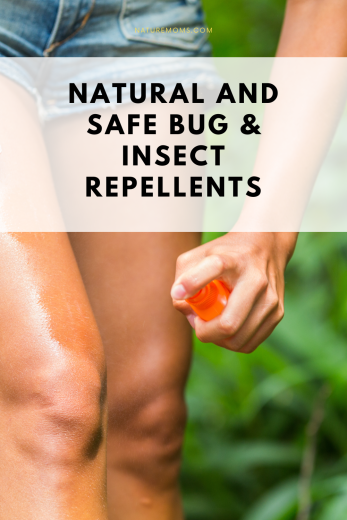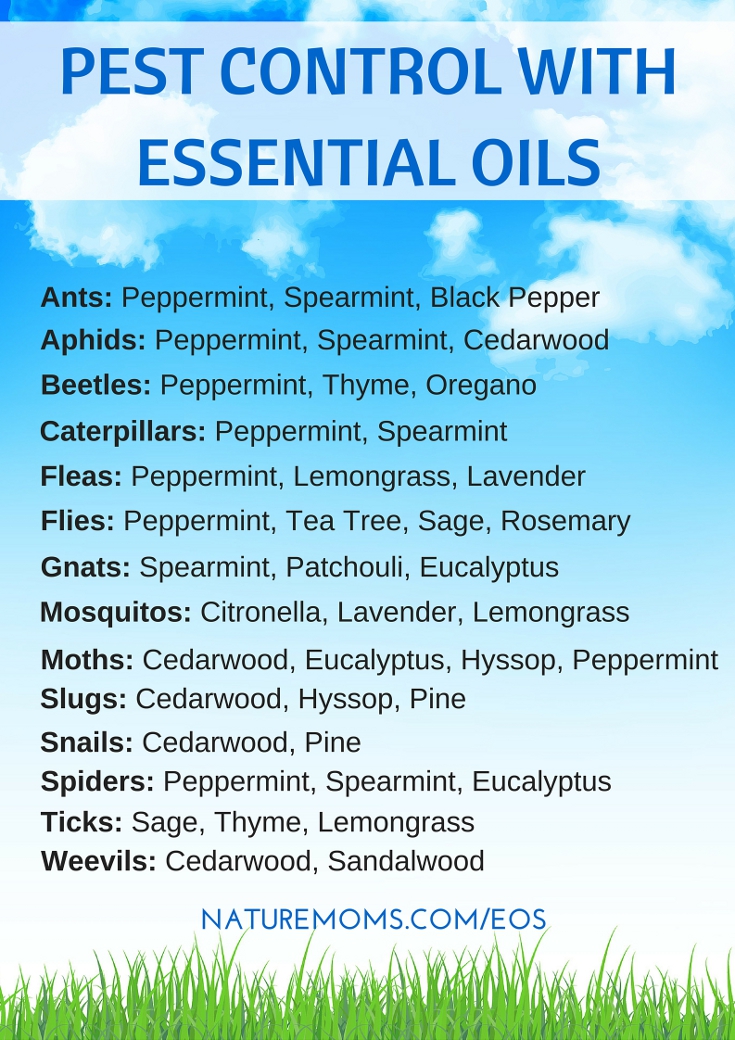 Pesky! That’s what most folks call those critters that seem to gather in the most undesirable spots in your home and yard and bother you when you are trying to enjoy yourself in the great outdoors. What’s also bothersome are the toxic sprays and chemicals used to remove or repel those unwanted pests. There is growing evidence that synthetic pesticides pose a health risk to humans and animals. A more natural approach to controlling bugs and insects is necessary for health and an environment that thrives.
Pesky! That’s what most folks call those critters that seem to gather in the most undesirable spots in your home and yard and bother you when you are trying to enjoy yourself in the great outdoors. What’s also bothersome are the toxic sprays and chemicals used to remove or repel those unwanted pests. There is growing evidence that synthetic pesticides pose a health risk to humans and animals. A more natural approach to controlling bugs and insects is necessary for health and an environment that thrives.
Bug Barriers For the Body
First it is probably good to note that the U.S. Environmental Protection Agency suggests the use of “non-chemical” methods to deter biting insects before any consideration of chemical insect repellents.
Most bug sprays and repellents contain DEET. DEET is a pesticide that is considered HIGHLY toxic. Experts report that up to 56% of DEET applied to the skin penetrates the skin and about 17% is absorbed into the blood stream.
One of the major adverse effects of DEET exposure to children is seizures and brain damage. As parents, it is wise to utilize caution, care and knowledge in your approach to protecting your children from dangerous insect bites. Consider using barriers like window screens and netting to shield your children and protect their skin with long-sleeve shirts, long pants and socks.
Maybe it is because I am soooo naturally sweet but bugs LOVE me. I am a mosquito beacon and it seems my kids are too. During the summer months we can be found several evenings a week attending some outdoor event so we need a good insect repellent. One natural way to repel bugs is to make an essential oil spray. Just put some clove, peppermint, eucalyptus, or cedar oils inside a carrier oil like Jojoba and spray as needed. Also be sure to check with an essential oils guide to make sure you are using safe oils and dosages for children.
We are trying out a few new conventional products this summer too:
Burt’s Bees Herbal Insect Repellent – Natural ingredients, the primary one being rosemary.
Skedattle Anti-Bug Spray – Made with essential oils, including citronella, Lemongrass, Peppermint, and Vanillin.
SmartShield SPF 30 Insect Repellent Combo – This is a combo products that repels bugs and protects you from the sun. It comes in a spray or towelettes. I would go for the spray myself but the towelettes could be very handy for young kids. This is not quite 100% natural but it is DEET free.
California Baby Baby Bug Repellent – Citronella lemongrass and cedar essential oils (known for their safe and effective bug repellent properties). Repels fleas, mosquitoes, ticks, and biting flies.
Bite Blocker Insect Repellent – Contains Plant Oils, Plant Extracts, Plant Derivatives, and Skin Moisturizers.
Bug Barriers For the Home and Garden
There are some vegetables that can be used to get rid of insects like ants, wasps, mites, moths, flies and other pests. Cucumbers have natural and generally non-toxic ingredients that repel or get rid of bugs. All you need to do is slice them up and place them in insect target zones like window sills and door jams. You can also use garlic to repel bugs. Simply grind it up with water and apply to bug infested areas. Other safe ingredients you can use to create barriers to bugs are cayenne pepper, cinnamon, powdered charcoal, bone meal, talcum powder or chalk.
As you are creating these ‘bug barriers”, keep in mind that different pests have different aversions. You’ll have to test and see what substance works best for getting rid of the bugs.
Another way to think of these barriers is to think pretty. In other words, grow certain plants around the periphery of your home. By using certain plants you are not only creating a beautiful home but you are deterring pests as well. A few plants that are known to repel ants and aphids include spearmint, peppermint and pennyroyal. Other plants that smell good to human but repel insects like flies are mint and basil.
The thought of a roach in the home can make a person feel as if their home is not clean. The fact is that sometimes the habits of others can cause these unwanted creatures to enter into your home. Baking soda and powdered sugar mixed in equal parts is a good roach killer. Just spread the solution around the area where you see roaches and soon your unwanted guests will vanish.
If your pet is worried with fleas, here is a very simple solution to helping them get relief. Grind rosemary leaves into a fine dust and sprinkle it onto your pet or its bedding to ward off fleas.
What about the slimy slugs and snails? There are solutions other than salt to get rid of them. All you need to do is invert a flower pot near a shady plant. Use a stick to prop up the flower pot or place on uneven ground. What you are trying to do is give enough of an entrance way for slugs and snails. They will crawl under the rim to avoid the heat. At the end of the day, check the flower pot and remove the slugs and snails.
Spiders? Check out an article I wrote awhile back about getting rid of spiders naturally.
And who can forget fruit flies? Find out how to get rid of fruit flies.
Toxic chemicals do not have to be the answer to removing bugs. To help the environment, your health and that of your family, try the natural approach.




I have been on the anti-DEET wagon for quite some time and only using natural repellents. Five months ago, my daughter was diagnosed with Lyme Disease. We caught it early enough to prevent long term damage, but she underwent emergency surgery, a hospital stay, and many weeks of taking antibiotics. Needless to say, it was awful.
The epidemiologist that finally figured out it was Lyme Disease (we went through a horrible period where no one could tell us what was wrong), told us that the risks of Lyme Disease far outweigh the risks of DEET (especially in MN).
Now I’m in a parenting quandary. Which risk is really worse?? I don’t want my children to suffer from any debilitating illness.
Fortunately, my work in the children’s environmental health field requires me to research topics just like this everyday. In my research on DEET alternatives I found a study conducted by the US Centers for Disease Control that found that a natural repellent called Repel Plant Based Lemon Eucalyptus offered the best protection out of all of the DEET-free products they evaluated. It was comparable to repellents containing 7% DEET and repelled mosquitos for about 5-6 hours and ticks for 8.
After my experience, if we camp or hike during peak tick season, I might opt for a repellent with DEET. Maybe just applied to clothes. I still haven’t totally decided. But, for everyday needs, I am going with Repel. I want the natural choice that really works, because mosquitos and ticks aren’t just a nuisance, they are a health risk.
Learn more ways to live green and protect your family from everyday toxic exposures at http://www.healthychild.org
I am still wondering about slugs. Great that you can catch them, but I don’t think I could kill them. What do you do with them after you found them under the flower pot?
Alexa Coopers last blog post..Sugar is Bad for You! Links
Alexa,
Just take them somewhere else where they are not bothering you. I rarely kill pests…just transplant them.
My family has had a terrible time with bugs. I live in Michigan surrounded by bugs, water and trees! My home was invaded (no joke, in my bed) for three years by springtails. I thought we were going to move out this summer. My kids swell up like crazy when bit by a bug. We spent way to much on bad, bad pesticides before going and learning about being “green” and because we knew nothing else. I became very, very ill! After a ton of research and trying all sorts of products saying they were natural and they work I found a few things I have to share with you. From my personal experience these work Tiffany! I’ll send you some if you want. Lice Shampoo too! No joking and I say this because I became sick and now after using these products…no springtails! Phew!
http://www.kidsafepestcontrol.blogspot.com/
We have alternatives. Spray pesticides and the bugs become immune and we hurt ourselves and the environment!
Sommers last blog post..Tips to Avoid BPA
I know you posted this a while back about springtails, our house is infested slso. I need to lnow what if possible you used to kill yours. HELP PLEASE
Us too, please share if you found any information!!
I’m not advocating for DEET, but I’m not sure “natural” alternatives less injurious to health. Cedar exposure is well-known to cause skin inflammation and liver disease in laboratory animals. These plants and trees developed natural poisons to repel insects, but that does not mean they are non-poisonous to humans.
Rick R.
You might have the wrong type of peppermint but also the concentration and strengh could be making a difference.
Sommers last blog post..Tips to Avoid BPA
First, I´d like to tell you how much I love this blog… though I´m far from being a parent myself (uh, hello, I´m only 17). But a lot of this stuff is useful still, so thanks a lot!
However, about this post I have some doubts. My mother and I have been “cultivating” (that is, letting it grow wild in every direction… whatever) peppermint for six or seven years now, and the most ants we always have… right beside the peppermint. So are you sure this really works? Maybe we just have the wrong sort of peppermint, or whatever.
Pfefferminztea it may also be that after 6-7 years the ants have adapted to the peppermint and are no longer bothered by it. It could also be the type of peppermint or the type of ant. I would look online to see if you can identify the ant type and then read up on natural remedies
Sommer, thanks for the offer but I wouldn’t have a use for them. We don’t have bug issues.
I have used aan Avon Skin So Soft bug repellent that is DEET free called Expedition that I really like. You can buy it online.
Bonnies last blog post..Baby’s gone!
What is your opinion on Repel Plant Based Lemon Eucalyptus Insect Repellent? After speaking to someone from customer service, I was told the age limit warnings have to do with skin sensitivity and possible irritation. I was also told that it can be used by someone that’s pregnant. Is this true?
Repel and Bite Blocker are the two strongest, natural repellents (according to tests conducted by the US FDA) and Repel is even recommended by the US Centers for Disease Control. They ward off mosquitos and ticks as well as DEET without toxic chemicals. As with anything, you should do a little skin test on kids to make sure they don’t have a reaction, but you should be fine using it while you’re pregnant.
Essential oils are a safe alternative to chemical insect repellents for children. Adults should use DEET cautiously, but never the kiddos.